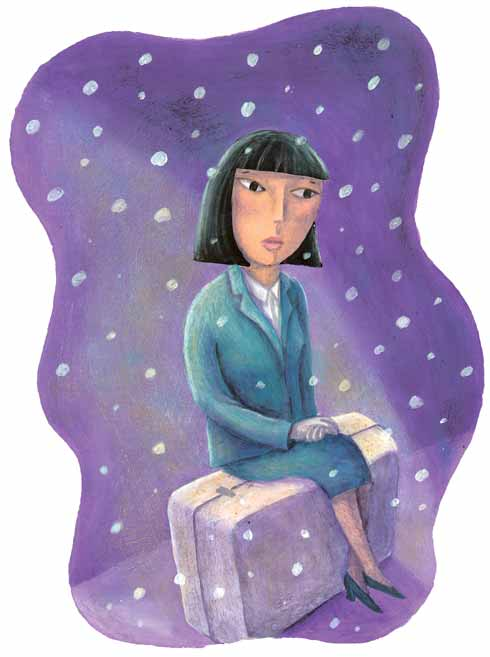LETTERS & E-MAIL

Riding with the 'Enemy' on a Cold Christmas Night
HERE WAS AN UNSEEN PASSENGER on our crowded Trailways bus as it pulled out of the Phoenix terminal that December day in 1942. His name was Hatred. It had been just one year since the Japanese surprise attack on Pearl Harbor, and anger against the enemy rumbled just below the surface of all our thoughts.To all appearances, we were in a holiday mood. Our crowded busload of travelers shared lunches and life stories as we rolled slowly northward across the Arizona desert at a less than blazing speed of 35 mph, the mandated speed that was meant to save desperately needed rubber for the war effort. It also meant that the trip home to Flagstaff, my first since taking a teaching position in southeastern Arizona that fall, would be a long, slow one.
It was Christmastime, but it was also wartime. Every seat on that bus held someone who knew someone in a uniform. Those who had not already lost loved ones lived in dread of being next to receive a "we regret to inform you" telegram from Uncle Sam.
Somehow, Sunday school admonitions to "love our enemies" didn't seem relevant. We were learning to hide fear with jokes, but jokes couldn't cure the hatred toward those who had caused this terrible disruption to our lives. So, though we laughed and sang as we rode through the sweet-smelling desert, we nursed an undercurrent of anxiety, anger and grief.
I remembered the first boy I ever danced with, now at rest with the sunken battleship USS Arizona. I remembered a friend, dear funny Harvey, dead on some forsaken South Pacific island. I remembered that I wouldn't be able to start a family for who knew how many yearsif ever-with my soon-to-be husband. He was enlisted already. What if some Japanese sniper killed him?
The pale daylight gave way to a winter sunset by the time our bus finally worked its way past Wickenburg and mastered the steep hill approaching Yarnell (no convenient freeway from Phoenix to Flagstaff existed in those days).
Finally arriving at the little mountain town of Prescott, we made room for a lively mariachi band whose music added to the holiday spirit while we continued north to Ash Fork.
The last strains of "Noche de Paz" were just dying out when our bus braked into Ash Fork's old train station where the Atchison, Topeka and Santa Fe Railway made a stop for passengers taking the Peavine line south to Prescott and eventually Phoenix. Big snowflakes drifted down onto the dirty platform. Pulling our coats around us against the cold, we crawled out. At last we could stretch our legs.
And then I saw her. She had turned her suitcase on its edge to provide herself a seat. There she sat, completely detached from her bleak surroundings, one gloved palm resting in the other, silken ankles crossed, smooth black hair daring the chill wind to disturb it. Dim lights outlined her beautiful, trim little body in its exquisitely fitted blue suit, matching shoes on her tiny feet.
She stared straight ahead, still as a picture in a magazine, dark eyes studying something far, far away to the west. Was she seeing a home she had left behind? There she sat. Totally lovely. Totally perfect. Totally self-contained.
And totally Japanese. The Enemy. Everything I hated.
Yet somehow this enemy didn't seem so evil. I knew she must be one of the Japanese who, in our nation's fear after Pearl Harbor, were being forcibly removed from their homes in California and brought inland for internment. This particular enemy was leaving everything she owned except the clothes she wore, her suitcase and its contents. There was no way for her to know if she would ever be allowed to go back home. Yet there she sat, stoically awaiting whatever was ahead. What would I have done in her place? My problems began to look smaller.
No, I couldn't hate her. Instead, all I could manage was grudging admiration for her courage and self-control under terribly frightening, difficult circumstances. I knew that Ash Fork was where some of the Japanese from California were put on the Peavine train to take them south to Arizona internment camps for the duration of the war. My little Enemy was on her way to prison.
An immaculately dressed Japanese man came and tapped her on the shoulder. She went with him to the southbound train. I crawled back on our bus, not so crowded now.
The Enemy went to an internment camp and I went to my Flagstaff wartime wedding. But as I went, I carried a little less hatred in my baggage. Al
Already a member? Login ».